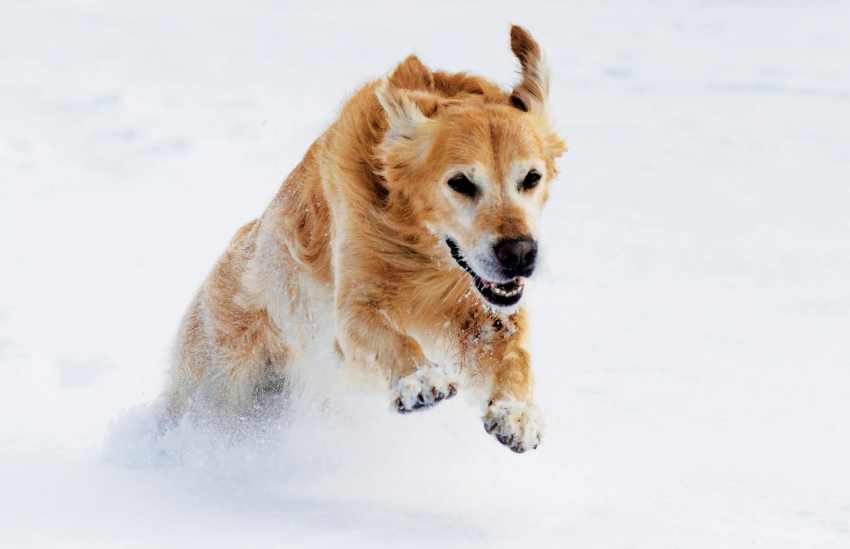As the winter months set in, paying particular attention to your furry friend’s health and well-being is crucial. Like humans, dogs can be susceptible to various winter-related challenges, from cold temperatures to dry air and potential hazards.
In this guide, Keeping Your Dog Healthy in Cold Weather, we’ll explore practical tips to ensure your canine companion stays happy and healthy during the colder months.
adogtrainingcourse.com is a participant in the Amazon Services LLC Associates Program, which means that if you buy something on Amazon.com after clicking a link on this website, I might receive a small commission at not extra cost to you.
Maintain a Comfortable Temperature:
Dogs, especially those with short fur, may struggle to stay warm in frigid temperatures. Provide a cozy and warm bed for your dog, and consider using blankets to create a snug sleeping area.
If your dog spends significant time outdoors, invest in a well-insulated doghouse to protect them from the cold.
Protect Paws from Ice and Salt:
Winter often means icy sidewalks and roads. Ice-melting chemicals and salt used on sidewalks can be harsh on your dog’s paw pads. Before going outside, consider applying a protective paw balm or dog booties to shield their feet.
Maintain a Healthy Diet:
Dogs may burn more calories trying to stay warm during the winter. Adjust their diet accordingly to provide the necessary energy. Consult with your veterinarian to determine the appropriate amount and type of food for your dog’s specific needs.
Stay Active Indoors:
Cold weather can make it challenging to maintain regular outdoor exercise routines. Create indoor play spaces and engage your dog with interactive toys. Consider puzzle toys or hiding treats to keep them mentally stimulated.
Regular Grooming:
Proper grooming is essential during winter. A well-brushed coat helps to insulate against the cold and removes dry, flaky skin. However, be cautious not to over-bathe your dog, as it can strip their skin of natural oils.
Hydration is Key:
Even in colder weather, dogs need an adequate supply of fresh water. Winter air can be dry, leading to increased dehydration risk. Ensure your dog always has access to clean water.
Thinking about a dog’s hydration during winter may seem counterintuitive to many people, so I have included a section below on why dogs need to stay hydrated during winter.
Protect Against Hypothermia and Frostbite:
Know the signs of hypothermia and frostbite in dogs. If your dog exhibits shivering, lethargy, or disorientation, bring them inside immediately and contact your vet.
Veterinary Checkup:
Schedule a winter checkup with your veterinarian. Ensure vaccinations are up-to-date, and discuss any specific concerns about your dog’s health during winter.
Be Mindful of Antifreeze:
Antifreeze is highly toxic to dogs. Be cautious when using it in your car, and promptly clean up any spills. Symptoms of antifreeze poisoning include vomiting, seizures, and difficulty breathing.
Plan Safe Outdoor Activities:
Enjoy winter activities with your dog, but be aware of potential hazards. Avoid frozen bodies of water, as ice may not be stable. Additionally, keep your dog on a leash in areas where wildlife may pose a threat.
By taking proactive measures, you can ensure your dog remains healthy and happy throughout the winter season. From providing warmth and protection to maintaining a balanced diet and regular exercise, these tips will help you create a winter-friendly environment for your beloved canine companion.
Remember, a little extra care goes a long way in safeguarding your dog’s well-being during the colder months.

Why Dogs Need to Stay Hydrated During Winter
While it may seem counterintuitive, dogs must stay hydrated during the winter months just as much as in the summer. Cold weather can create conditions that contribute to dehydration in dogs, and pet owners should be aware of the reasons behind this necessity.
Here are several factors explaining why maintaining proper hydration is crucial for dogs during winter:
Dry Air and Heated Environments:
During winter, indoor environments are often heated, leading to dry air. Just like humans, dogs can become dehydrated in such conditions. The lack of humidity in the air can cause increased water loss through respiration and may result in dehydration if not compensated by sufficient water intake.
Physical Activity:
Dogs still need regular exercise, even in colder weather. Outdoor activities like playing in the snow or walking can be just as energy-demanding as in the summer. Increased physical activity requires adequate hydration to support overall health and prevent fatigue.
Fur Coats and Insulation:
Dogs have fur coats that help them stay warm in winter, but this insulation can also increase sweating. While dogs don’t sweat as much as humans, they still lose water through panting and the moisture on their paw pads. Replenishing this lost fluid is essential to avoid dehydration.
Dehydration Risks in Snow:
Dogs may be more likely to consume snow during winter outings. While snow can contribute to hydration, there must be a sufficient substitute for water. Ingesting large amounts of snow can lead to hypothermia if the dog’s body temperature drops. Encouraging regular water intake is crucial to ensure adequate hydration.
Potential Health Issues:
Dehydration can lead to various health issues in dogs, including kidney problems, urinary tract infections, and digestive issues. Maintaining proper hydration helps prevent these problems and supports your dog’s overall well-being.
Senior Dogs and Puppies:
Senior dogs and puppies are particularly vulnerable to dehydration. Senior dogs may have reduced kidney function, making them more susceptible to dehydration, while puppies are still developing and have higher water requirements relative to their body weight. Paying extra attention to these age groups during winter is crucial.
Illness and Medications:
Dogs may be more prone to illnesses during colder months, and some medications may increase the risk of dehydration. Proper hydration is essential to support the immune system and aid in the effectiveness of medications.
Always provide access to clean and fresh water to ensure your dog stays adequately hydrated during winter. Consider placing water bowls in various locations, both indoors and outdoors, and monitor your dog’s water intake to ensure it meets their individual needs. If you notice signs of dehydration, such as lethargy, dry gums, or sunken eyes, consult with your veterinarian promptly to address any potential health concerns.
Products mentioned within this page:
Ameritex Waterproof Dog Bed Cover
Petsfit Insulation Kit for Dog House
Paw Protectors for Winter Snowy Day – Top Seller on Amazon
Wild Acre Maximum Strength Paw Balm for Dogs – Winter Paw Protector for Ice, Snow, and Salt
Dog Brick Interactive Treat Puzzle Dog Toy
adogtrainingcourse.com is a participant in the Amazon Services LLC Associates Program, which means that if you buy something on Amazon.com after clicking a link on this website, I might receive a small commission at not extra cost to you.


